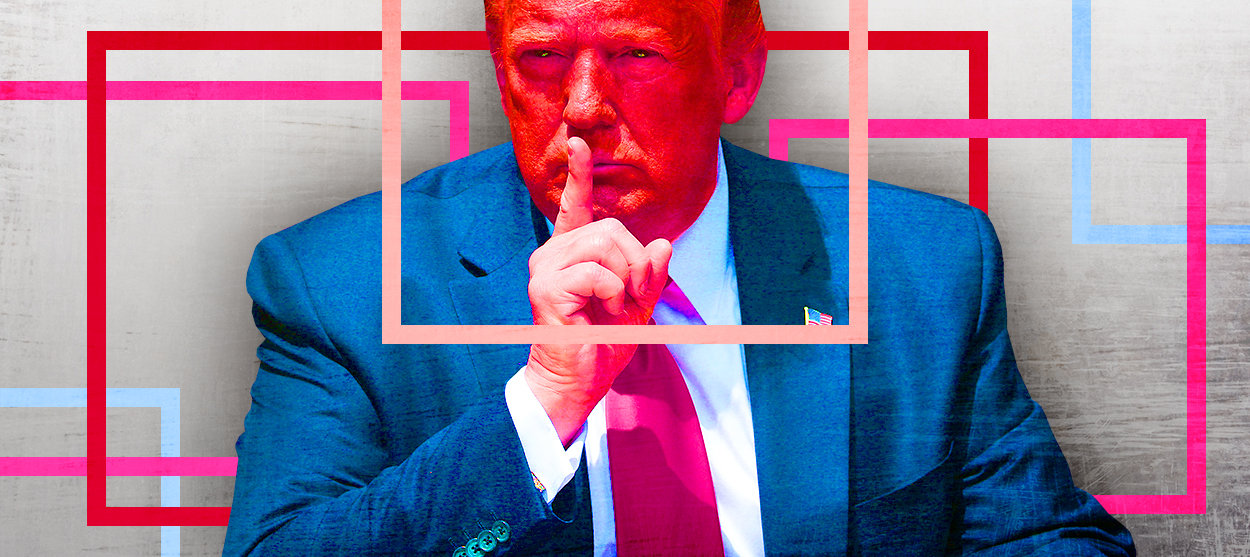Trump knew it all along
Everyone laughed when Trump said he took the virus seriously back in March. Now it's not so funny.


A free daily email with the biggest news stories of the day – and the best features from TheWeek.com
You are now subscribed
Your newsletter sign-up was successful
In mid-March, as the enormity of the COVID-19 pandemic had become undeniable to all but the conspiracy theorists and cranks, President Trump tried to backfill his earlier downplaying of the virus by claiming, with characteristic bravado, "I've felt it was a pandemic long before it was called a pandemic."
"I've always viewed it as serious," he said.
This occasioned howls of incredulous laughter and the inevitable official media fact check. Associated Press called B.S. on Trump thusly: [H]is claim doesn't match his rhetoric over the last two months before the World Health Organization declared the virus outbreak a pandemic. Trump instead repeatedly claimed COVID-19 was under 'control' in the U.S. and suggested it would incur little economic damage, possibly disappearing magically by April."
The Week
Escape your echo chamber. Get the facts behind the news, plus analysis from multiple perspectives.

Sign up for The Week's Free Newsletters
From our morning news briefing to a weekly Good News Newsletter, get the best of The Week delivered directly to your inbox.
From our morning news briefing to a weekly Good News Newsletter, get the best of The Week delivered directly to your inbox.
Politifact's Jon Greenberg rated Trump's claim a "Pants on Fire"-level lie: "Until late February, Trump spoke as though the U.S. problem was limited and well under control. That description is at odds with the nature of a pandemic. We can't know what was in Trump's mind when he aimed to reassure the public, but his words did not fit with the threat of a pandemic."
Now, thanks to explosive revelations in Bob Woodward's forthcoming book Rage, we do know what was on Trump's mind." As of February 7, according to a conversation recorded by Woodward, Trump knew COVID-19 was easily transmitted and more lethal than a seasonal flu. "This is deadly stuff," he told Woodward.
Worse, Trump admitted to what was obvious to everyone with eyes to see it: "I wanted to always play it down."
Which means that Donald Trump was telling the truth — sort of — when he made his mid-March pivot and began leveling with the American public.
A free daily email with the biggest news stories of the day – and the best features from TheWeek.com
Of course, Trump being Trump, he wildly overstated the extent of his foreknowledge. He didn't "feel it was a pandemic long before it was called a pandemic," as though the facts had yet to cohere and he alone had spied the truth. He was informed by his national security staff in late January that COVID-19 had the potential to devastate the world like the 1918 flu pandemic and was the "biggest national security threat you face in your presidency."
In conversation with Woodward, Trump defended his rhetoric of minimization; he was merely trying to avoid creating a panic. This is no doubt what his apologists will claim, too, as fallout from the Woodward book continues throughout the next several news cycles.
This, too, is a lie.
Trump was concerned overall with the precipitous drop in the stock market — not street-level panic among average Americans. When it became clear that the market was going to plummet anyway — investors weren't dumb enough to believe Trump and Larry Kudlow on this score — the game was up.
If we need proof that Trump wasn't projecting a stiff upper lip to reassure a jittery public, look at what wasn't being done behind the scenes in January and February: No ramp-up of testing or contact tracing capability. No increase in the stockpile of personal protective equipment. No emergency manufacture of ventilators.
The Trump administration's private posture over the winter matched its public posture: His head was in the sand. No machines were going brrr behind the scenes.
His money, as it were, was where his mouth was: hoping for a miracle.
Just so there's no misunderstanding, I'm not saying Trump deserves retroactive credit for telling the truth back in March.
He wasn't.
What's clear now is that even when he tells an approximation of the truth, Trump still manages to tell a lie.
Scott Galupo is a freelance writer living in Virginia. In addition to The Week, he blogs for U.S. News and reviews live music for The Washington Post. He was formerly a senior contributor to the American Conservative and staff writer for The Washington Times. He was also an aide to Rep. John Boehner. He lives with his wife and two children and writes about politics to support his guitar habit.
-
 Film reviews: ‘Wuthering Heights,’ ‘Good Luck, Have Fun, Don’t Die,’ and ‘Sirat’
Film reviews: ‘Wuthering Heights,’ ‘Good Luck, Have Fun, Don’t Die,’ and ‘Sirat’Feature An inconvenient love torments a would-be couple, a gonzo time traveler seeks to save humanity from AI, and a father’s desperate search goes deeply sideways
-
 Political cartoons for February 16
Political cartoons for February 16Cartoons Monday’s political cartoons include President's Day, a valentine from the Epstein files, and more
-
 Regent Hong Kong: a tranquil haven with a prime waterfront spot
Regent Hong Kong: a tranquil haven with a prime waterfront spotThe Week Recommends The trendy hotel recently underwent an extensive two-year revamp
-
 The billionaires’ wealth tax: a catastrophe for California?
The billionaires’ wealth tax: a catastrophe for California?Talking Point Peter Thiel and Larry Page preparing to change state residency
-
 Bari Weiss’ ‘60 Minutes’ scandal is about more than one report
Bari Weiss’ ‘60 Minutes’ scandal is about more than one reportIN THE SPOTLIGHT By blocking an approved segment on a controversial prison holding US deportees in El Salvador, the editor-in-chief of CBS News has become the main story
-
 Has Zohran Mamdani shown the Democrats how to win again?
Has Zohran Mamdani shown the Democrats how to win again?Today’s Big Question New York City mayoral election touted as victory for left-wing populists but moderate centrist wins elsewhere present more complex path for Democratic Party
-
 Millions turn out for anti-Trump ‘No Kings’ rallies
Millions turn out for anti-Trump ‘No Kings’ ralliesSpeed Read An estimated 7 million people participated, 2 million more than at the first ‘No Kings’ protest in June
-
 Ghislaine Maxwell: angling for a Trump pardon
Ghislaine Maxwell: angling for a Trump pardonTalking Point Convicted sex trafficker's testimony could shed new light on president's links to Jeffrey Epstein
-
 The last words and final moments of 40 presidents
The last words and final moments of 40 presidentsThe Explainer Some are eloquent quotes worthy of the holders of the highest office in the nation, and others... aren't
-
 The JFK files: the truth at last?
The JFK files: the truth at last?In The Spotlight More than 64,000 previously classified documents relating the 1963 assassination of John F. Kennedy have been released by the Trump administration
-
 'Seriously, not literally': how should the world take Donald Trump?
'Seriously, not literally': how should the world take Donald Trump?Today's big question White House rhetoric and reality look likely to become increasingly blurred
